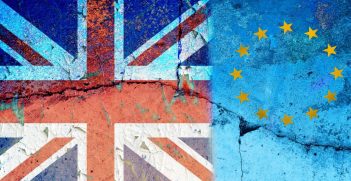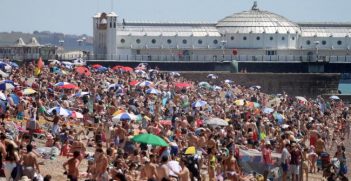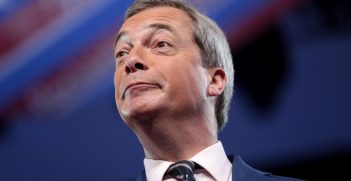Are the Dreary Steeples of Fermanagh and Tyrone Emerging Once Again?
Winston Churchill in 1922 expressed the exasperation many English politicians have felt in dealing with the seeming endless recurrence of the “Irish Question” in British politics. In 2021, Brexit and the riots in Belfast have revived this sentiment.
Most outsiders, however, believed that with the Good Friday Agreement of 1998, the “Irish Question” had finally been resolved. The Agreement brought to an end thirty years of violence between the IRA and smaller Republican groups, the British security services, and the various Loyalist paramilitary organisations. In spite of a small number of violent incidents, the peace has mostly held since then, though it is a peace of a distinctly cold variety, with little sign of warmth or intermingling between the two communities. Now, however, many observers are now worried that those dreary steeples may be brought to the forefront of the world’s attention once again. Are they right to be concerned?
The proximate cause of the riots is not entirely clear, but many experts believe that it lies in a police crackdown on criminality amongst gangs linked to Loyalist paramilitaries. During the Troubles, both Loyalists and Republicans turned to crime to help finance their operations, but for some, the profits from criminal activities came to be an end in themselves. This aspect of the conflict has continued on unabated since 1998. However, few observers would doubt that, although the crackdown may be part of an explanation, Brexit is also part of the equation.
What does Brexit have to do with it? Well, the answer lies partly with what must be one of the most strategically inept political operations on the planet – the Democratic Unionist Party (DUP), the main Protestant party. Prior to Brexit, Northern Ireland’s place in the United Kingdom, the supposedly main raison d’etre of the DUP, seemed more secure than ever. With the financial difficulties which had hit Dublin in the aftermath of the Global Financial Crisis, even a significant number of Northern Irish Catholics expressed support for remaining in the UK. A smart DUP would therefore have done everything it could to keep the UK in the EU – Britain’s prosperity and the role of the EU in rendering the border between Northern Ireland and Eire largely invisible was arguably in the process of weaning many Northern Catholics away from a desire for Irish unification. That’s not how it turned out though.
Influenced by the same heedless jingoism which infected English Brexiteers, the DUP swung its support behind the Leave Campaign. Although Northern Ireland as a whole voted Remain, the Protestant community voted predominantly Leave. The victory of the Leave campaign in the UK did not necessarily have to lead to the present troubles. This is where the DUP made their second blunder.
After Theresa May’s Conservative government unexpectedly lost their majority in the 2017 general election, the DUP propped the Conservatives up in power with a “confidence and supply” arrangement. Rather than using their influence to moderate Brexit, the DUP joined in the push for a “hard Brexit,” involving Britain leaving the Single Market as well as the EU as a whole. But here’s the rub – if the UK was to leave the Single Market, then there would need either to be border controls of some type between Northern Ireland the Irish Republic (infuriating Nationalists) or between Northern Ireland and the rest of the UK. While the Conservatives were dependent on DUP support in the Commons, the issue held up the Brexit negotiations.
When Boris Johnson became Prime Minister, he claimed that there would be a border in the Irish Sea “over his dead body.” Yet Johnson is not known for his personal loyalty. Once the Conservatives had regained their governing majority in the 2019 general election, Johnson was happy to concede to border controls between Northern Ireland and the UK, so as to fulfil his pledge to the Conservative faithful to “deliver Brexit.” The Northern Ireland issue, which English conservatives have never very much cared about, was resolved by Johnson essentially giving the EU what it wanted in return for a deal by the December 2020 deadline.
So to return to the riots, they are seen as an expression of anger and fear on the part of the Loyalist community that their bonds with the rest of the UK have been frayed by Johnson’s Brexit deal. Moreover, there is a renewed fear that history is not on their side. Sinn Fein, which had been quiet on the issue, are pushing for a referendum on Irish unification. If, as expected, Brexit hits the British economy hard, many Northern Irish Protestants, especially the educated middle class and business community, may ask themselves what would be so bad about joining a united Ireland, in a reversal of the situation which pertained with respect to many Northern Irish Catholics prior to Brexit.
Is this likely then to lead to a return to the violence of 1968-98? I think it’s unlikely for a number of reasons. First, Irish unification, even if it does occur, may not do so for some time. If it does, it is likely to be brought about at least in part through the positive support of some Ulster Protestants. An increasingly secularised Republic of Ireland, moreover, is very unlikely to launch much in the way of religious pogroms against the Northern Protestants, who may find themselves significantly better off economically. Conversely, if Northern Ireland remains part of the UK, the safeguards put in place for the rights of the Catholic minority by the Good Friday Agreement should prove sufficient to keep the peace.
Cross national research shows that internal conflict is most likely to occur in the case of actual or potential repression of one ethnic or religious group by another. As long as all the people of Northern Ireland are accorded their fundamental human rights and treated with dignity, peace is likely to endure regardless of which flag flies over government buildings.
Dr Charles Miller is a lecturer in Strategic Studies at the Australian National University. He is a PhD graduate in political science from Duke University. His research interests include public opinion and foreign policy, military effectiveness and far-right politics.
This article is published under a Creative Commons License and may be republished with attribution.





